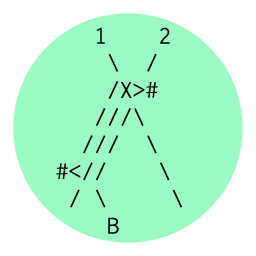
Oou was a language experiment created in 2003 by the amazing Sonja Lang, best known for her Toki Pona language. Oou is unfinished and has more-or-less disappeared from the Web, but I hope Lang doesn’t mind my writing it up; it is one of my favorite language interventions, and one I use regularly to explore the concept of glitched language.
Oou is small; one can memorize the vocabulary in a few hours. However, even Oou experts cannot communicate clearly using it, as miscommunication and confusion are integral to the language. A comparison with Toki Pona might make Oou’s character more clear. Toki Pona was designed to “express maximal meaning with minimal complexity.” With a vocabulary of only 123 words, it offers an expressive language built on combinations of simple terms, emphasizing clarity and straightforwardness. Although partly due to its unfinished state, Oou has an even smaller vocabulary than Toki Pona. Instead of being designed for clarity, each word in Oou has a multitude of meanings. Its design goals (from the original site, now offline):
- Make you go out of your mind
- Produce multiple meanings and weird homonymic insights
- Alienating, intoxicated effect
- Go against expected conventions of language yet be fully function as a language
- Explore the connections between reality and surreality, meaning and nonsense
- Virtually impossible to understand one another: acts of communication become trippy idea-art
- Sentence meaning flows with your state of consciousness
To this end, Oou employs only a stream of adjoining vowels with no consonants to break them up. It is written completely in punctuation marks. All sentences end with a question mark, although actual questions can be indicated by beginning a phrase with this word:
*_
The word above would be pronounced [o a] according to the translation of Oou letters and dipthongs to IPA:
! /i/
= /ɔ/
^ /y/
_ /ɑ/
(f /œ/
[] /u/
@@ /æ/
* /o/
/~ /e/
& /ø/
# /ɛ/
Apart from it’s visual similarity to brainfuck, we can see how the language connects to esoteric programming in terms of esolanguages like Shakespeare and Piet. These draw our attention to the text of code, obscuring its behavior, similar to what Oou does with spoken and written communication. There is no way to learn Oou well enough to no longer be acutely aware of how the language appears / sounds. Two people can have an entire conversation in Oou and both think they’re talking about something completely different.
More content from the original site:
Grammar
- Word order: OVS
- Words may be any part of speech
- Adjectives follow the noun they modify
- If the subject is =_ (I, you), it is left out and interpreted from context
- No definite or indefinite article
- No verb tenses
- No gender or number
Sample Sentences
As you will see, a single Oou sentence can have many correct English translations, depending on context and your state of mind.
For example, !*(f ** means any of the following: insane language, friendly genocide, friendly language or insane genocide.[]*_ []=!&_ ?
I take drugs.
I help drugs.
I eat trees.
You help trees.
I eat the sofa.
You help the sofa.
etc.=_ ^^/~ ?
I love you.
You love me.
I love myself.
I avoid myself.
I avoid you.
I flatten myself.
I flatten you.
etc.
And the full vocabulary list of the language:
^^/~ love, turnip, avoid, flat, flatten
^*^ cute, asshole, valley, close, shut
^/~* silent, quiet, nose, take, fear, afraid
^= person, idea, tool, glasses
_!/~ rabbit, hare, wonderful, lip
_/~@@ go, shit
!*(f language, genocide
!= be, come, become
(f^! friend, wall
[]! laugh, talk
[](f return, go back, house, destroy, most
[]*_ drug, tree, sofa, couch
[]= lesbian, steal, boat
[]=!&_ eat, consume, help
@@=! daughter, toaster
*_ oh, question particle (sentence prefix)
** insane, friendly
*/~ now, never
/~/~=/~= happy, shopping centre, mall
&@@_ gender, light
# have, make, of, at, in, by, on (genitive, locative preposition)
#@@#=@@ computer, flower, cold (disease)
=_ you, I, me, my (normally omitted when subject)
=_^ cat, ask, question, other, passion
=@@[] real, young, room



